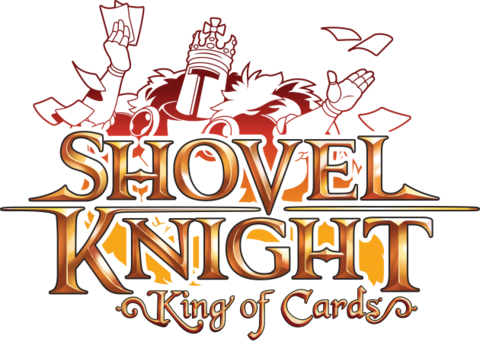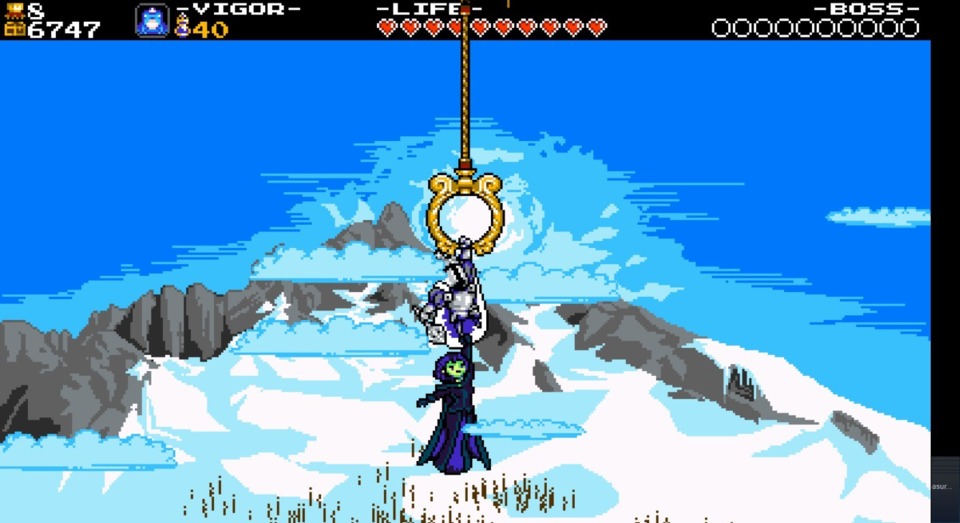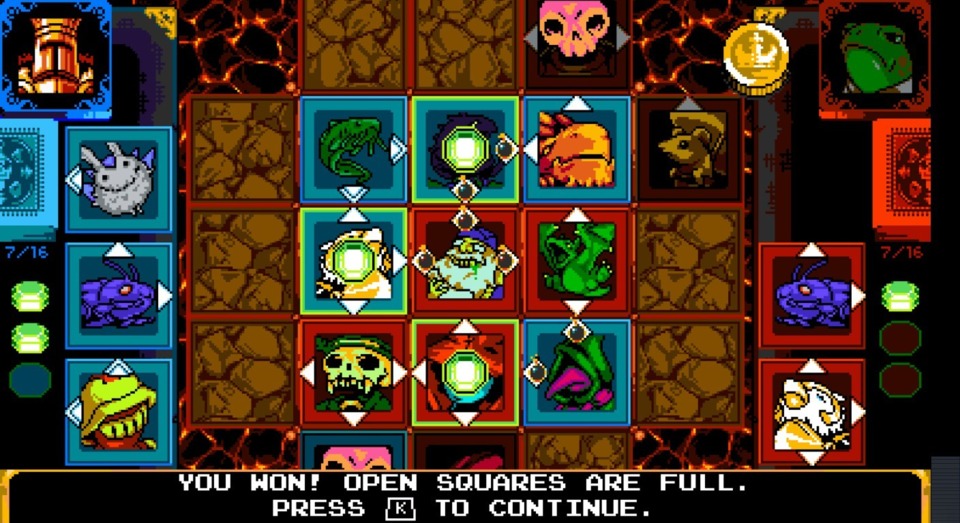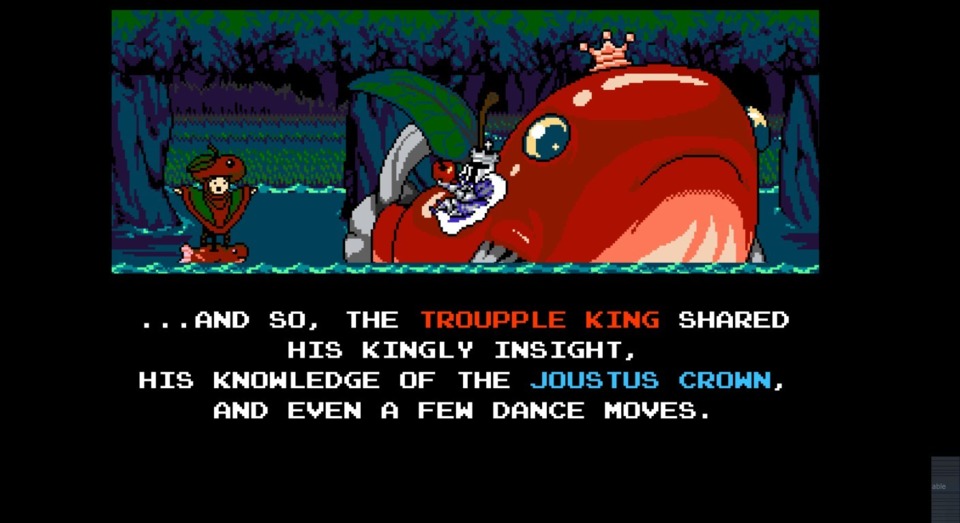
- Game: Yacht Club Games's Shovel Knight: King of Cards
- Release Month: December
- Quick Look: Coming Soon?
- Started: 10/12.
- Completed: 12/12.
I have to marvel at Yacht Club Games's business model. Three DLC campaigns, two of which are equally the length of the original game if not longer, and all of them free to anyone who bought the original game when it was still ostensibly in need of sales. The cynic in me always has to look past the magnanimity of a freebie like this and ponder the financial benefit of such a move, but I'll be darned if I have the business sense to work it out. Still, I suppose it's best not to look a gift horse in the mouth, or one of Shovel Knight's bipedal horsepeople at least.
King of Cards is the fourth and final Shovel Knight campaign, following the original (retroactively dubbed "Shovel of Hope"), the Plague Knight campaign "Plague of Shadows," and the Specter Knight campaign "Specter of Torment." King of Cards in particular follows King Knight, the most buffoonish of the original Knights of the Order of No Quarter boss troupe - the first boss Shovel Knight defeats, in fact - and puts him in his own prequel game, presenting the auspicious circumstances that made him King of Pridemoor and a delusional servant of the Enchantress. This tale, for whatever reason, involves playing a lot of card games, a mini-game about which I'll get into in just a moment.

Like the other campaigns, King of Cards is predominantly a 2D platformer that takes elements from several decades-old classics of the genre as a deliberate homage, though in King of Cards's case a new inspiration has entered the fray: Wario Land: Super Mario Land 3 for the Game Boy, and its sequels. As a platformer hero King Knight is a little slower than the other campaign leads, but uses his extra weight for shoulder charges which are capable of damaging foes and destroying blocks alike. More to the point, a successful shoulder charge (it is ineffectual against certain enemies and types of wall) will result in a mid-air corkscrew jump. This jump is the key to forward progress, as it allows King to spring off enemies and objects in the environment (including those that would normally hurt him) to reach higher places, much like Shovel Knight's shovel hop and Specter Knight's cloudwalking did in their campaigns. The starting areas quickly get you acclimated to this new control scheme, and it shouldn't feel too alien after Specter of Torment regardless. (King of Cards unfortunately lacks the the little procedurally generated obstacle course of Specter of Torment that allows you to practice the new moves to your heart's content.) A typical platforming instance, then, might involve shoulder-charging a mid-air platform and using the subsequent corkscrew jump to get on top of it, or using the corkscrew jump to hop along a series of otherwise damage-causing hazards like cannonballs (not unlike those Super Mario Maker levels where you have to spin-jump on a thwomp or piranha plant, for example). King Knight can also acquire "Heirlooms" that work the same as the other special sub-weapons and equipment that Shovel Knight can acquire; my favorite was one that put you temporarily inside a bubble you can then charge out of, as it frequently saved my bacon after a botched leap. In order to address the higher combat difficulty, every third or fourth hit on the same enemy produces a recovery heart: this means that aggression is often the key to survival, as a good charge/corkscrew combo against a tough boss can net you the hearts you need to stay in the fight.
Then there is the card game. Sigh. I wanted to like this thing, as the superficial similarities to Triple Triad - the Final Fantasy VIII card game - were immediately apparent. However, while the higher numbers on the Triple Triad cards merely flipped the neighboring cards over, in the King of Cards variant - named Joustus - cards are physically pushed to the side by new placements dependent on their arrow configurations and this can lead to all manner of unpredictable chain reactions. Cards are also not necessarily placed in an empty space on the three by three grid (and the game experiments with more than just a nine-tile square) but can be placed slightly adjacent of an already placed card in order to push it. There's rules and layers of complexity to learn even early on, and it continues to get more complex as the game progresses when it introduces cards with conveyor arrows, bomb arrows, flip arrows, polarity switching, and more. It's a headache if you were looking for something casual and collectible like Triple Triad, though probably still too basic for CCG diehards. Worse still is that Joustus opponents aren't at all balanced at any juncture. When you first reach a new "Joustus House," and the game has several, every player inside will have better cards than you. What few special cards you've managed to accrue will quickly be lost against the CPU players' stronger decks and uncanny AI, unless you strike it lucky, and that means either having to win those valuable cards back from them or - more often the case, since the gap between you and the CPU has inevitably been widened by you losing a good card and them gaining it - buying any lost cards off the shady vendor Chester. You'll regularly wander into these dens of card sharks and be taken for a ride by all the unfamiliar new rules and superior decks. It doesn't help that nearly every CPU opponent is a tactical genius, especially the "champions" of each house and the duel-happy NPCs who start filling your hub (it's an airship this time), and you'll be paying through the nose for any unique cards you end up giving away. Fortunately, besides a tournament early on, it doesn't seem like these card games are strictly necessary for progression: you can dismiss them and focus on the game's core platforming content if you'd prefer. Still, for a feature that evidently saw a lot of development time and resources and is the big new innovative selling point for this specific Shovel Knight campaign to hang its crown upon, it's a bummer that it's too irksome, too unbalanced, and too convoluted for its own good. And it cold sucks to keep sheepishly returning to the vendor to buy all your best cards back; it's the worst fucking feeling.

On the platforming side, it takes after many of the best lessons of Specter of Torment although it doesn't quite flow as well as that campaign did. Specter of Torment had you flying through levels once you'd got its cloudwalking down - if you somehow skipped it but played The Messenger instead, it has a similar zip to it - and the speed at which you'd hop from one obstacle to the next made the original Shovel Knight campaign feel clunky in comparison. King of Cards falls somewhere between the two in terms of clunkiness, so in that regard it's a bit of a step back, but at the same time we're talking about being nestled between two of the best, most concisely-controlled 2D platformers of recent memory so that's still nothing to sneeze at. It's enough to carry the game through to its conclusion, especially with the way the game has broken up areas into a large number of more digestible smaller stages (most of which take about five to ten minutes) where each can have a theme or gimmick that it can explore to its natural limit in that single instance; say, bouncing across the tentacles in Treasure Knight's aquatic area or those platforms that sink into the swamp when you put too much weight on them in Specter Knight's graveyard. King of Cards is also the first campaign, I believe, to add secret exits: something that Super Mario World fans have been hoping to see in this series for a while. The routes to these secret exits are better hidden than almost anything else in the game, and frequently lead to little bonus side areas on the overworld map where you can get some extra funds or a rare Joustus card or two. My advice? Regularly check the tops of walls.
I generally liked the story and characters, even if I've seen most of them before, though there's no getting past King Knight's obnoxious braggart personality. It's only mildly amusing when he cuts off NPCs mid-soliloquy and roundly belittles everyone he meets, this rudeness being the sole cause of most of the game's duels and boss fights, and there are times when you get hints at the spoiled child he truly is, never more so than when his elderly mother is doting on him with freshly baked pastries (and getting flirty with the charming former King of Pridemoor; a slowly developing romantic entanglement that disturbs King Knight to no end). The story itself is predictable enough, especially given that this is a prequel, but I did appreciate one component of the ending: the destruction of every Joustus card in the kingdom. It should also go without saying that the soundtrack is still amazing: the game uses a combination of returning tracks and those developed specifically for this campaign, and both the new and old merge together seamlessly. There's a handful of older tracks that have been remixed with a more regal air to suit the new protagonist, but most of the new tracks concern new bosses and new locations so they're wholly original compositions.

It's a little tough to know where to stick King of Cards in my ranking of the four campaigns, because I played the first one almost five years ago now. King of Cards is certainly weaker than Specter of Torment, but the vast amount of quality original content (maybe excepting the card game) puts it well above Plague of Shadows. If you're someone who bought Shovel Knight: Treasure Trove or the original game when it was still standalone, you have a fairly good idea whether you want to play this content or not and it's free for you regardless. If you've yet to try Shovel Knight, you'll want to pick up the Treasure Trove compilation chiefly for the core campaign and the Specter Knight campaign - two fantastic games that would be worth the asking price individually - and King of Cards will be there waiting for you to slake any remaining thirst for some solid retro platforming. Maybe the card game will click for you in a way it didn't for me. In any case, you can't really argue with that price. As for me, it's probably going to be somewhere fairly low on my GOTY list this year, but unless I ever figure out what kind of The Producers style fiscal ploy Yacht Club Games is running with all these free campaigns they have my eternal affection and support for all this wonderful gratis content.

Log in to comment